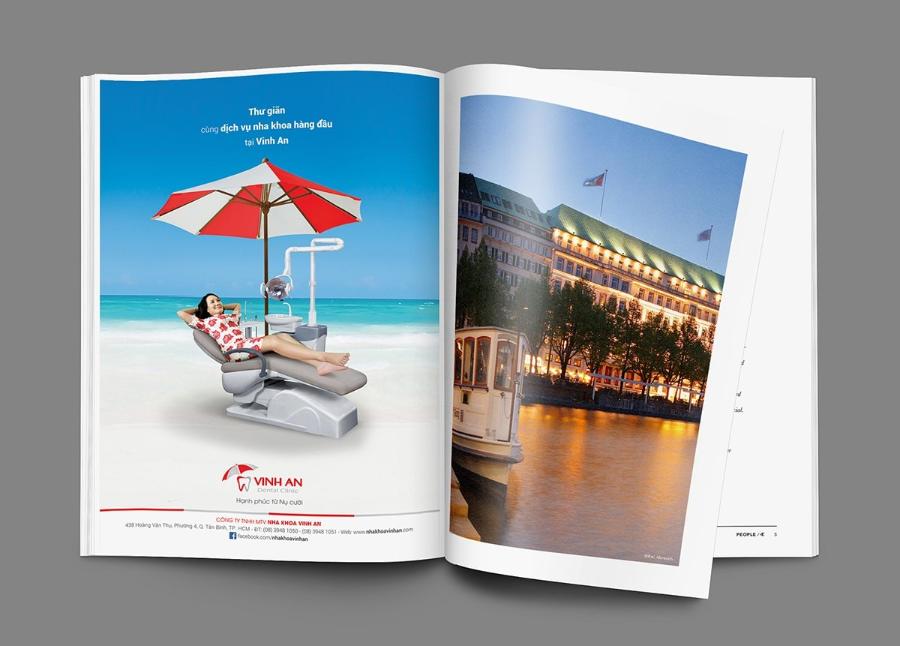Best Selling Products
Print Ads: Definition and Key Features to Know
Nội dung
- 1. What are Print Ads?
- 2.1 Newspaper advertising
- 2.2 Outdoor advertising (Billboards)
- 2.3 Flyers and brochures
- 2.4 Business cards and catalogues
- 3. Basic features of Print Ads
- 3.1. High reliability
- 3.2. Ability to reach specific target audiences
- 3.3. Strong visualization
- 3.4. Longevity
- 3.5. Ability to influence viewers' emotions
- 3.6. Building reputation and brand image
- 4. Benefits of Print Ads in marketing strategy
- 4.1. Enhance brand awareness
- 4.2. Reaching people who do not regularly use the internet
- 4.3. Combine with multi-channel marketing strategies
- 5. Challenges for Print Ads in the Digital Age
- 5.1. The decline in traditional readership
- 5.2. High production costs
- 5.3. Difficult to measure effectiveness
- 6.New direction for Print Ads
- 6.1. Combining with digital technology
- 6.2. Target a niche market
- 6.3. Increase creativity
- 7. Conclusion
Print Ads is a traditional form of advertising that still plays an important role in marketing strategies. This article will help you understand what Print Ads are and its basic features.

In today's digital age, online advertising is dominating, but Print Ads (print advertising) has not lost its value. This is a traditional method that has existed for a long time, still has the ability to make a strong impression and bring effectiveness in many advertising campaigns. In this article, Sadesign will explore with you what Print Ads are and the basic characteristics of this type of advertising.
1. What are Print Ads?
Print Ads, also known as print advertising, is a form of advertising information transmission through printed publications such as newspapers, magazines, outdoor signs, brochures, catalogs, and other printed materials. This is a traditional advertising method that was widely used before the development of the internet and digital advertising channels.
.jpg)
This is an effective advertising method in building brand image and reaching specific customers. Especially in industries with loyal readers of printed publications. Print advertising requires creativity in design and content to attract attention and make a strong impression on viewers.
Although the growth of online advertising has made print advertising less popular in recent times, Print Ads still hold an important place in many marketing campaigns, especially in specific markets and target audiences.
2. Popular types of Print Ads
Print Ads can come in many different forms, each serving a distinct purpose:
2.1 Newspaper advertising
Newspaper advertising is a traditional form of marketing but still plays an important role in building a brand and reaching the target audience. With its wide reach and high credibility, newspaper advertising helps businesses convey messages effectively, while creating a professional image in the eyes of the public.
To achieve optimal effectiveness, choosing the right content, format and media channel is key, ensuring that information is conveyed clearly and engagingly.
2.2 Outdoor advertising (Billboards)
Outdoor advertising (Billboards) is an effective form of communication, using large panels placed in strategic locations such as streets, busy intersections, or areas with high traffic.
With the ability to reach a wide target audience and create a strong visual impression, outdoor advertising plays an important role in building a brand and enhancing product recognition. To optimize effectiveness, businesses need to focus on creative design, clear messaging and choosing a display location that fits the overall marketing strategy.
2.3 Flyers and brochures
Flyers and brochures are two important marketing tools that help businesses effectively convey information about products, services or events to customers. Flyers are often designed simply, focusing on providing concise, easy-to-understand information and attracting immediate attention.
.jpg)
Meanwhile, brochures are more in-depth, with detailed content and a professionally presented layout, aiming to create a lasting impression and build trust with customers. The choice between flyers and brochures depends on the marketing goals as well as the target audience that the business is aiming for.
2.4 Business cards and catalogues
Business cards and catalogues are important tools in building brand image and promoting products and services of the business. A well-designed business card not only shows professionalism but also leaves a deep impression on partners and customers.
Meanwhile, the catalogue acts as a detailed introduction document, providing comprehensive information about the products or services that the business provides. The harmonious combination of design, content and printing quality of both business cards and catalogues will contribute to enhancing reputation, building trust and promoting sustainable development for the business.
3. Basic features of Print Ads
Print Ads have some outstanding features that make it still popular with many businesses, despite strong competition from digital advertising. These features help Print Ads to be effective in some specific situations.
3.1. High reliability
Print advertising is considered one of the most trusted forms of information. Due to its longevity, consumers tend to trust information from printed publications such as newspapers and magazines more. This is due to the quality of the product and the reputation of the publishing platform.
3.2. Ability to reach specific target audiences
One of the great benefits of Print Ads is their ability to reach a highly targeted audience. For example, an ad in a health magazine can reach readers interested in the topic. This form of advertising is also very effective in targeting local audiences through local publications.
3.3. Strong visualization
Print Ads create a stronger visual impact than online advertising because they can present images and messages clearly. A print ad can use color, images, and layout to attract attention, while also conveying a sense of luxury and professionalism.
3.4. Longevity
Another advantage of Print Ads is their longevity. Ads in printed publications such as newspapers and magazines can be retained for a long period of time. Furthermore, flyers, brochures or catalogues can be retained by consumers as a reference, providing a lasting advertising effect.
.jpg)
3.5. Ability to influence viewers' emotions
Print Ads have the ability to stimulate viewers’ emotions more strongly than online advertising. Print ads can convey messages through images, text, and especially paper materials, helping customers feel the “truth” and “feel” of the product or service they are approaching.
3.6. Building reputation and brand image
Print advertising is often used to build and maintain brand reputation. A well-designed advertisement, with high quality printing, can increase the image value of a brand in the eyes of consumers.
4. Benefits of Print Ads in marketing strategy
Although there are many different forms of advertising today, Print Ads still have significant benefits in the marketing strategy of businesses.
4.1. Enhance brand awareness
An effective print advertising campaign can help your business build strong brand recognition. Quality print advertising will help your brand stay in the minds of consumers for a long time.
4.2. Reaching people who do not regularly use the internet
Although the internet is very popular today, there are still groups of people who do not use the internet regularly or do not have access to digital platforms. For these groups of customers, Print Ads is an effective tool to reach and convey messages.
4.3. Combine with multi-channel marketing strategies
One of the most effective strategies today is to combine print advertising with online advertising. This not only increases the coverage of the message but also helps businesses reach customers through many different channels, maximizing the effectiveness of the campaign.
5. Challenges for Print Ads in the Digital Age
.jpg)
However, it cannot be denied that Print Ads is facing many major challenges in the digital age:
5.1. The decline in traditional readership
With the explosion of the internet, the readership of traditional newspapers and magazines is on the decline. Consumers today tend to search for information via mobile devices and social media instead of printed publications. This has significantly reduced the reach of Print Ads.
5.2. High production costs
Print advertising often requires high production costs, from design to printing and distribution. This raises questions about cost-effectiveness compared to digital advertising, which can be deployed quickly with more flexible budgets.
5.3. Difficult to measure effectiveness
While digital platforms offer detailed analytics to measure campaign effectiveness, Print Ads struggle to accurately determine the impact on target audiences. This makes many businesses hesitant to invest in this form of advertising.
6.New direction for Print Ads
To survive and thrive in the digital age, Print Ads need to adapt and innovate:
6.1. Combining with digital technology
The combination of Print Ads and digital technology is a notable trend. QR codes, augmented reality (AR) or links to online platforms can be integrated into print ads to create multi-channel engagement with customers.
6.2. Target a niche market
Instead of trying to compete with digital advertising across the board, Print Ads can focus on niche markets where consumers still appreciate the value of high-quality print content.
6.3. Increase creativity
In a world where customers are bombarded with advertising messages, creativity is key to making Print Ads stand out. Using unique designs, meaningful messages, or innovative layouts can help brands make a stronger impression in the minds of customers.
7. Conclusion
The basic characteristics of Print Ads such as credibility, the ability to strongly impact consumer emotions, and the ability to build brand image are the factors that help this type of advertising maintain a long-term influence. By combining Print Ads with modern advertising methods, businesses can optimize their marketing strategies, increase customer reach, and achieve sustainable business goals.












































